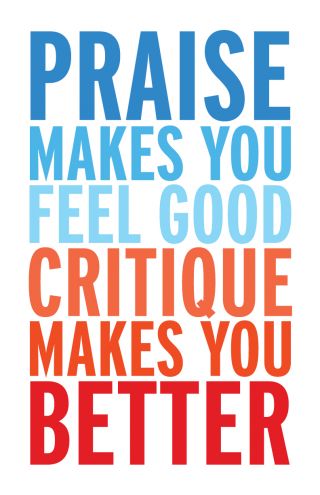Career
Does Criticism Motivate More Than Praise?
A core psychological principle—praise more than criticize—may be overrated
Posted May 18, 2014

One of psychology and education's core principles is that to engender change, one should emphasize praise over criticism. The rationale is that it’s easier to get someone to do more of what they already do than to get them to change. Also, praise builds self-esteem and, in turn, people’s believing they can improve weaknesses.
But criticism may sometimes be an even more powerful motivator. Examples:
- A 250 lb. woman, Cearra Swetman, wearing a Hooter’s tee shirt, was told, “You don’t look like any Hooter’s girl I’ve ever seen.” That criticism is what finally motivated her to lose weight—128 pounds to be precise, after which she got hired as a waitress at—you guessed it--Hooters.
- A high school counselor told Phil Padrid, who had done poorly in school, that he “wasn’t college material” and should consider getting a job in the post office. He’s now a veterinarian.
- A professor told me I couldn’t write.That made me want to prove him wrong. I’ve since had seven books and 2,500 articles published in major national and regional publications.
Beyond anecdotal evidence, a University of Exeter study found that criticisms—taunts actually--from opposing fans make players play better.
And that makes sense. Yes, praise can motivate but being told you can’t may be even more motivating because it's hard to accept that you're unalterably inadequate. In contrast, praise encourages complacency. The recipient can't help but relax a bit: "Okay, I'm good enough, at least for a while." That may partly explain why Asians—from cultures that tend to emphasize self-effacement over praise—on average have below-average self-esteem but high average educational and career achievement.
Seek out criticism
When told "you can't" without your first having asked for input, you’re more likely to get angry and in turn, to think, “I’ll show that sonofabitch.” Thus, that criticism motivated you.
But even criticism you sought may motivate you to change and certainly reveals what others think you should improve on. Plus, people will respect your willingness to ask for feedback, especially if you ask well. For example, you might ask boss and coworkers something like, “Like all professionals, I’m trying to keep growing. I’d really appreciate candid feedback on where I’m doing well and where I might improve.”
Many people are reluctant to provide unasked-for criticism, so you might try TalentCheckup.com. It enables you to pick three to eight people to provide feedback anonymously by email.
When you should criticize
Society generally deems unasked-for criticism to be unkind and hubristic. But when it's well-intentioned, well-calibrated, and especially when offering a valid, constructive solution, I believe, it's a fine gift.
Of course, we must be cautious about criticizing someone who’s already feeling beaten down. Before opening our criticizing traps, we must assess whether the criticism would make the person more likely to try to prove you wrong or to become more inert.
The bigger picture
A few decades from now, we'll likely view psychology in 2014 as having been in its adolescence if not its childhood. Some of its core principles will likely be toppled. So for now, whether as counselors, clients, or in peer-to-peer interaction, we may be wise to be guided as much by case-by-case common sense as by broad-brush generalizations.
Marty Nemko was named “The Bay Area’s Best Career Coach” by the San Francisco Bay Guardian and he enjoys a 96 percent client-satisfaction rate. In addition to the articles here on PsychologyToday.com, many more of Marty Nemko's writings are archived on www.martynemko.com. Of his seven books, the most relevant to readers of this blog is How to Do Life: What They Didn’t Teach You in School. Marty Nemko's bio is on Wikipedia.


